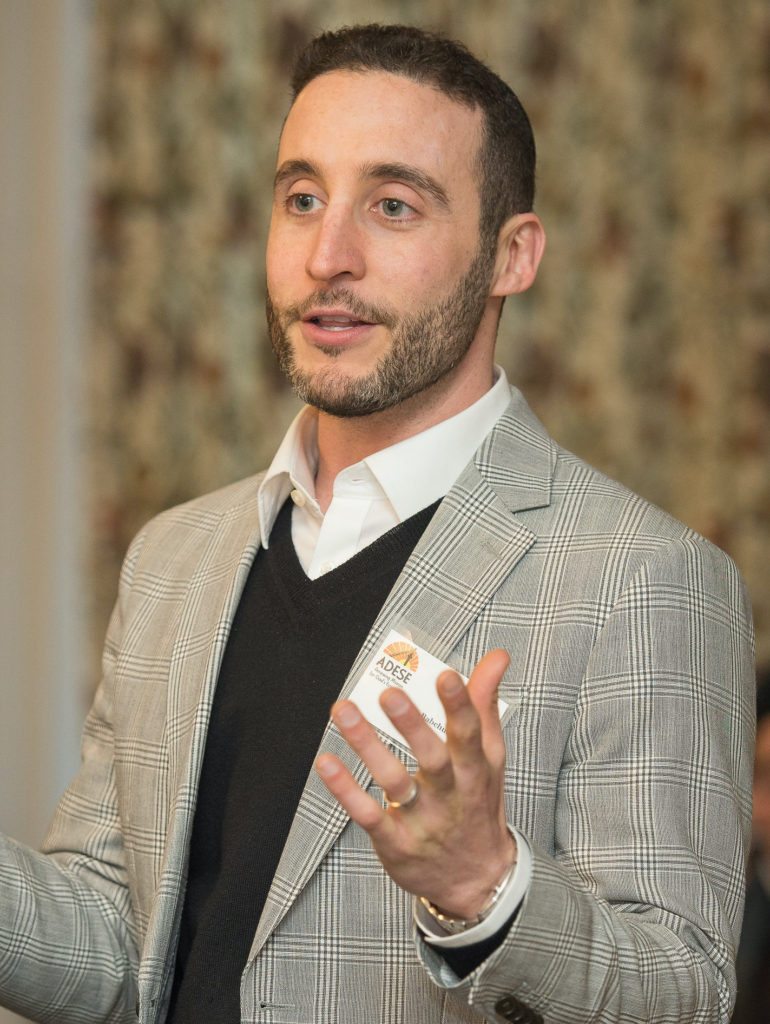Several weeks ago I was teaching Torah to a group of students from around the country that has met weekly for several months. As the sessions meet in the evening time, it usually means that I’m occupied with bedtime routines for our three children right up until 6:59 PM, at which point I make a mad dash into the bedroom to start the class, and wish my wife godspeed for the remaining half hour (on a good night) of the various rituals, routines, and meltdowns that accompany bedtime.
About 10 minutes into the class, I could hear that the pitter-patter of footsteps in the background was increasing, which meant that our two youngest kids were breaking free and chaos theory would once again emerge victoriously. Soon enough I heard the bedroom door creak open and our 15-month-old Ayla toddling into the room. She made a bee-line for me, arms up in the air, waiting impatiently to be picked up. As I was in the middle of the opening exercise for our class, I felt terrible about derailing the class, so as I picked her up, I turned to the group and – out of a deeply-ingrained habit – apologized profusely for the disruption.
Without a moment’s hesitation, several students unmuted themselves and lovingly scolded me for apologizing to them. They were nothing short of thrilled to have Ayla visiting the class. With just a few words of welcome and kindness, they reminded me of the incredible grace with which we’ve learned to treat each other as we’ve all done our best to keep it together during these last 14 months.
As I have been so many times during the pandemic, I was brought to tears by their understanding, by the heaviness of the moment, and by the profound realization that the walls I had long ago constructed to separate the many facets of my life had long ago come tumbling down.
Our text this week – a double-portion right in the middle of the Holiness Code (Leviticus 17-26) – opens in the aftermath of an unspeakable tragedy: the death of Aaron’s two sons. On the heels of their death, the text then pours out a myriad of laws – ethical and ritual – designed to invite the Israelites into a life of holiness.
The priestly text reads quite choppy, rarely offering segues or commentary between categories of holiness. Chapter 19, for example, jumps back and forth between laws about pure speech, sacrifices, familial respect, intimate relationships, and – interestingly – gleaning your field. One moment we read “When you sacrifice an offering of well-being to the LORD, sacrifice it so that it may be accepted on your behalf,” and the next “When you reap the harvest of your land, you shall not reap all the way to the edges of your field, or gather the gleanings of your harvest.”
What is so remarkable about the text is that it doesn’t feel the need to give us any context as it switches from the personal to the spiritual to the professional. In the eyes of the text, they are one and the same.
Who you are in the field is who you are in your life. And if our aspiration is to live up to the lofty invitation that opens Chapter 19 (“You shall be holy, for I, the Lord your God, am holy”), then the distinctions we have imagined between each of these aforementioned contexts are not only irrelevant, they’re dangerous, lest we think that we can be any less than our whole selves in any given moment.
As the COVID-19 pandemic has shoe-horned our complex lives into the four walls of our homes, with it has come the blurring of lines we once drew to separate the personal from the professional (remember “Work-Life Balance”??), our homes from our offices, our families from our communities, and so on. And whether we divided them by choice or as imposed by society, the neatness of our parsings has gone messy. And I would argue that it’s been a blessing: a unique opportunity for greater integration, for showing up whole wherever we go, and for learning to see all whom we encounter through a holistic lens.
As our sunrooms became our sanctuaries and bedrooms our boardrooms, the lessons of this Holiness Code came into greater focus. Being holy in one place but profane in another won’t cut it. Being fully ourselves in one context but a well-curated persona in another is a recipe for dis-integration – a guarantee that holiness will remain out of reach and we will grow out of touch. As Annie Dillard famously said in her book, The Writing Life,
“How we spend our days is, of course, how we spend our lives. What we do with this hour, and that one, is what we are doing.”
And just as our identities carry over across time, so, too must they transfer across context.
Two weeks ago, as the last frost of the winter melted away, I migrated my potted citrus trees out of the sunroom – my makeshift sanctuary for countless Zoom services – and into the backyard. The key limes, Meyer lemons, and kumquats were grateful for the fresh air and quickly rewarded my family with ripe fruit that we had been watching impatiently for months.
When my 5-year-old daughter, Nessa, saw that the kumquats had turned orange and were finally ready, she shouted with joy: “Abba! It’s ready! Can I eat it now??” As she has learned to do over the years, she pinched the fruit at its tip, slowly twisted it free, and held it in her hands, ready to recite the Bracha (blessing) over it. But just as the words were about to leave her mouth, she ran to the other side of the yard without any explanation.
Breathless, she knelt next to her baby sister Ayla and held out the fruit. Ayla, whose 4 teeth were just sharp enough to break the kumquat skin and give her her very first taste of its flesh, squealed with delight as she and Nessa passed the fruit back and forth until it was gone. Nessa couldn’t imagine keeping the fruit to herself; she just had to share it.
Who we are in the field is who we are in our lives. And our messy, complex identities are worth the schlep to take wherever we go – from the sanctuary to the field and everywhere in between, wherever we seek to live up to God’s greatest invitation: “You shall be holy, for I, the Lord your God, am holy.”
***Reprinted from April, 2021

Rabbi Elan Babchuck is committed to leaving behind a world that is more compassionate and connected than the one he found. In pursuit of that commitment he serves as the Executive Vice President at Clal, the National Jewish Center for Learning and Leadership, and the Founding Executive Director of Glean Network, which partners with Columbia Business School. He was ordained in 2012, and earned his MBA that year, as well.
A sought-after thought leader, he has delivered keynotes at stages ranging from TEDx to the US Army’s General Officer Convocation, published in The Atlantic, The Guardian, Washington Post, and Religion News Service, has a column for The Wisdom Daily, contributed to Meaning Making – 8 Values That Drive America’s Newest Generations (2020, St. Mary’s Press) and is the co-author of the forthcoming book Picking Up the Pieces: Leadership After Empire (2023, Fortress Press).
He also serves as:
a Founding Partner of Starts With Us, a movement to counteract toxic polarization in America,
a Research Advisory Board Member of Springtide Research Institute, which focuses on spirituality, mental health and Gen Z,
a founding board member of Beloved Network, a network of startup Jewish communities, and
a member of the Board of Advisors of the Changemaker Initiative.
He lives in Providence, Rhode Island with his wife, Lizzie Pollock, and their three children: Micah, Nessa, and Ayla. In his spare time, he finds sanctuary while climbing rock walls around New England and tending to his backyard garden.

